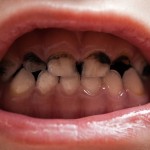
The aim of this trial was to test the use of motivational interviewing (MI) as an approach to control caries in indigenous children. This cluster-randomised trial was conducted in Cree communities in Quebec.
Cree women who recently had given birth or were between the 12th and 34th weeks of pregnancy were recruited. Mothers allocated to the test group were to attend one counseling session during pregnancy and up to 6 more sessions postnatally until their child’s second birthday. Two different MI scripts were available for pregnant and new mothers and who those whose children had experience tooth eruption. Mothers from test communities also received a “Privilege Card” to expedite dental care. Mothers in the control group only received educational pamphlets. Mothers, interveners and examiners were blinded to the allocation.
- 272 mothers (131 test, 141 control) were recruited with 241 children (110 test, 131 control) being available for examination at follow-up
- Caries prevalence in the control group was 76% (100/131) compared with 65% (72/110) in the treatment group( p = 0.17).
- Exploratory analyses suggested a substantial preventive effect for untreated decay at or beyond the level of the dentin, d3 (prevalences: 60% controls vs. 35% test), and a particularly large treatment effect when mothers had 4 or more MI-style sessions.
The authors concluded
Overall, these results provide preliminary evidence that, for these young, indigenous children, an MI-style intervention has an impact on severity of caries.
Links
Harrison R.L., Veronneau J. Leroux B. Effectiveness of Maternal Counseling in Reducing Caries in Cree Children. J Dent Res published online 13 September 2012 DOI: 10.1177/002203451245975
Harrison R, Veronneau J, Leroux B. Design and implementation of a dental caries prevention trial in remote Canadian Aboriginal communities. Trials. 2010 May 13;11:54. PubMed PMID: 20465831; PubMed Central PMCID: PMC2887856.

Very interesting. Would like to know more. I practiced dentistry in Appalachia for 25 years.
There continues to be a problem with early childhood caries.
Please contact me.
Hello, I am Catherine Guerrero, a pediatric dentist. I really liked this study. I am carrying out a similar study in PERU, in a maternity center, and I would very much like to have more information about what type of motivational talk the mothers had and what type of evaluation the babies received. with teeth already erupted. I would be very grateful for more current information. thank you